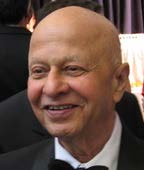A constant, guiding presence
« previous post | next post »
 Tomorrow there will be a memorial service for Aravind Joshi, who died on the last day of 2017 ("R.I.P. Aravind Joshi", 1/1/2018). Martha Palmer, who is flying in from Colorado for the event, sent me this remembrance:
Tomorrow there will be a memorial service for Aravind Joshi, who died on the last day of 2017 ("R.I.P. Aravind Joshi", 1/1/2018). Martha Palmer, who is flying in from Colorado for the event, sent me this remembrance:
Aravind was such a constant, guiding presence in my life, from 1980-2017. Always so kind and gentle, and so full of wise and considered advice, on every subject from linguistics and automata theory to life choices and university politics. And changeless. Always there, at every conference, every PI meeting, with a smile, a chuckle and a twinkle in his eye, taking great delight in the vagaries of human nature and the sea changes in government funding.
I first met Aravind when I came to Penn in 1980, ostensibly as a postdoc, although more accurately it should have been as a Visiting Student. He and Bonnie immediately took me under their wings, and I’m not sure I would have ever gotten a PhD if it had not been for their thoughtful and constructive advice and support. Those were the days of the Sloan lunches, prior to IRCS, and I was stunned by the energy and excitement that interdisciplinary discussions could generate. In those lunches Aravind exhibited all the knowledge, wisdom and humor that so many have described. He also evinced an unwavering enthusiasm for new ideas, even those that contradicted his stated views. Who else would have been open minded enough to welcome into his home department not just one, but two professors with alternative approaches to syntactic parsing, Mitch Marcus and Mark Steedman? Of course, now we know CCG is compatible with TAG, and TAG parsers are all statistical these days, but if Aravind had been more territorial those avenues might never have been explored.
His political savvy matched his intellectual powers, and he navigated the slings and arrows of deans and college politics faultlessly. Like when he was attempting to expand my part-time research position to “IRCS Director of Technology and Development” in 1997. Due to a clerical error the PENN database had my birth year as 1919, making me 78. Aravind got more than a little pushback from ENG over this appointment, with no explanation. With infinite patience he persisted in answering all their questions, and he wore them down. I got the job, but the look on the Dean’s face when Aravind and I walked into his office for our first meeting was priceless, as was the story that finally came out. No one chuckled over it more than Aravind.
His careful leadership was very effective in promoting gender equity in ACL, and you’ve seen his outstanding women PhD students. When we co-chaired ACL96 he was meticulous in ensuring both a gender and a geographical region balance on the program committee.
But what I loved about him the most was his gift for seeing more potential and talent in young people that they did themselves. He believed in us more than we believed in ourselves, and he had a knack for coaxing our best ideas and experiments into the light. He unfailingly delighted in our eventual successes and continued to offer astute advice and suggestions as long as he lived. He was my teacher, my mentor, my role model, and always my friend. No one can replace him.
Frank Southworth said,
February 20, 2018 @ 10:29 pm
I taught at Penn from 1959 to 2001, and Arvind (the oral Marathi version of his name–I never called him A-ra-vind, though that was approximately the classical Sanskrit version) was a frequent presence in my life, especially in the early years, during Zellig Harris's chairmanship of Linguistics. Among other things, he was my bridge to the Indian community–very important for a young assistant professor teaching Indian languages in the South Asia Department. In those days almost all of the students of Indian languages were white American graduate students in social sciences heading for fieldwork in India or Pakistan–in contrast to the 70's and 80's, when we had first-year Hindi classes numbering in the 30's, mostly consisting of second-generation Indians from all over the subcontinent.
Yes, Arvind was a low-key, gentle presence, always open to new people and new ideas–not a star who attracted followers and critics. Academia–and the world in general–needs more people like him.
[(myl) I agree that Aravind "was a low-key, gentle presence" — but he was also an intellectual star who influenced many students and colleagues in important ways, and his contributions to computational and mathematical linguistics, and to theories of discourse structure, will still be important a hundred years from now, when many self-promoting intellectual celebrities have become mere historical curiosities.]